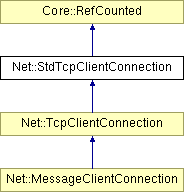Net::StdTcpClientConnection Class Reference
#include <stdtcpclientconnection.h>
Inheritance diagram for Net::StdTcpClientConnection:

Detailed Description
A TcpClientConnection represents a connected TcpClient on the server side. TcpClientConnection objects are created and maintained by a TcpServer object over the lifetime of a client connection. TcpClientConnection objects are used to communicate directly with the specific client represented by the connection object.TcpClientConnection objects are generally non-blocking. To receive data from the client, call the Recv() method until it returns true, this indicates that received data is available in the RecvStream. To read data from the RecvStream attach a StreamReader which matches the data format your expecting from the client (e.g. BinaryReader, TextReader, XmlReader, etc...). To send data back to the client just do the reverse: write data to the SendStream, and at any time call the Send() method which will send all data accumulated in the SendStream to the client.
(C) 2006 Radon Labs GmbH
Public Member Functions | |
| StdTcpClientConnection () | |
| constructor | |
| virtual | ~StdTcpClientConnection () |
| destructor | |
| virtual bool | Connect (const Ptr< Socket > &s) |
| connect using provided socket | |
| bool | IsConnected () const |
| get the connection status | |
| virtual void | Shutdown () |
| shutdown the connection | |
| const IpAddress & | GetClientAddress () const |
| get the client's ip address | |
| virtual Socket::Result | Send () |
| send accumulated content of send stream to server | |
| virtual Socket::Result | Send (const Ptr< IO::Stream > &stream) |
| directly send a stream to the server, often prevents a memory copy | |
| virtual const Ptr< IO::Stream > & | GetSendStream () |
| access to send stream | |
| virtual Socket::Result | Recv () |
| receive data from server into recv stream | |
| virtual const Ptr< IO::Stream > & | GetRecvStream () |
| access to recv stream | |
| int | GetRefCount () const |
| get the current refcount | |
| void | AddRef () |
| increment refcount by one | |
| void | Release () |
| decrement refcount and destroy object if refcount is zero | |
| bool | IsInstanceOf (const Rtti &rtti) const |
| return true if this object is instance of given class | |
| bool | IsInstanceOf (const Util::String &className) const |
| return true if this object is instance of given class by string | |
| bool | IsInstanceOf (const Util::FourCC &classFourCC) const |
| return true if this object is instance of given class by fourcc | |
| bool | IsA (const Rtti &rtti) const |
| return true if this object is instance of given class, or a derived class | |
| bool | IsA (const Util::String &rttiName) const |
| return true if this object is instance of given class, or a derived class, by string | |
| bool | IsA (const Util::FourCC &rttiFourCC) const |
| return true if this object is instance of given class, or a derived class, by fourcc | |
| const Util::String & | GetClassName () const |
| get the class name | |
| Util::FourCC | GetClassFourCC () const |
| get the class FourCC code | |
Static Public Member Functions | |
| static void | DumpRefCountingLeaks () |
| dump refcounting leaks, call at end of application (NEBULA3_DEBUG builds only!) | |
Member Function Documentation
| int Core::RefCounted::GetRefCount | ( | ) | const [inline, inherited] |
get the current refcount
Return the current refcount of the object.
| void Core::RefCounted::AddRef | ( | ) | [inline, inherited] |
increment refcount by one
Increment the refcount of the object.
| void Core::RefCounted::Release | ( | ) | [inline, inherited] |
decrement refcount and destroy object if refcount is zero
Decrement the refcount and destroy object if refcount is zero.
| const Util::String & Core::RefCounted::GetClassName | ( | ) | const [inline, inherited] |
get the class name
Get the class name of the object.
| Util::FourCC Core::RefCounted::GetClassFourCC | ( | ) | const [inline, inherited] |
get the class FourCC code
Get the class FourCC of the object.
| void Core::RefCounted::DumpRefCountingLeaks | ( | ) | [static, inherited] |
dump refcounting leaks, call at end of application (NEBULA3_DEBUG builds only!)
This method should be called as the very last before an application exits.